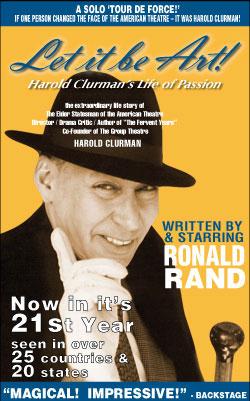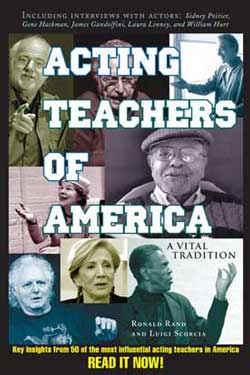Michael McElroy
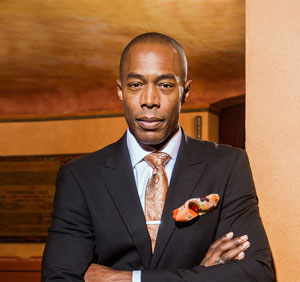 is a 2019 Special Tony Honor award-winning director and teacher. He has been chosen as Director of Diversity Initiatives of Undergraduate Drama in Tisch School of the Arts at New York University. Mr. McElroy is Head of Vocal Performance in the New Studio on Broadway, the musical theater studio in Undergraduate Drama and he served as Associate Chair of Undergraduate Drama from 2016 – 2018. As a performer, Mr. McElroy has appeared on Broadway in “Sunday in the Park with George” (2017 revival with Jake Gyllenhaal), “Next to Normal,” “RENT,” “The Wild Party,” “Big River” (Tony nomination, Drama Desk nomination), “The Who's Tommy,” “Miss Saigon,” “Patti LuPone on Broadway,” “High Roller Social Pleasure Club.,” “HAIR” (City Center Encores Series). He also performed with the New York Philharmonic in “Candide” at Lincoln Center. Mr. McElroy’s National Tours include: “Next to Normal,” “RENT,” “Big River” (LA Ovation nomination), and “SARAFINA.” Off-Broadway, he was seen in Terrance McNalley’s “Some Men” (Second Stage Theater), “BLUE” (Roundabout), “Violet” (Original Cast, Playwrights Horizons, Drama Desk Nomination), “Thunder Knocking on the Door” (Minetta Lane) and “Richard III” starring Denzel Washington at New York Shakespeare Festival. His film and television includes “Rent Live on Broadway,” “Romance and Cigarettes,” “Stonewall,” “After Forever,” “Cantebury Law,” “Michael Jackson Concert,” and “2014 Tony Awards” performing with Sting. As a teacher in Vocal Performance, Mr. McElroy has taught at University of Michigan in Ann Arbor, University of Melbourne/Victoria College of Arts, and at Carnegie Mellon University. As a Vocal Arranger, his work has been seen on Broadway in “Disaster!,” “Street Corner Symphony,” and Off-Broadway in Katori Hall’s “Our Lady of Kibeho,” Three Mo’ Tenors,” and the revival of Disney’s “Aida.” Michael McElroy is the Founder/Musical Director and Arranger for Broadway Inspirational Voices(BIV). In June 2019, Broadway Inspirational Voices was awarded the 2019 Tony Award Honor for Excellence in Theater by American Theater Wing. BIV is a diverse choir of Broadway performers from such shows as” Ain’t Too Proud,” “Alladin,” “Hamilton,” “Book of Mormon,” “The Lion King,” “Wicked,” “Tootsie,” “Phantom of the Opera,” and “Beetlejuice.” Broadway Inspirational Voices has performed including at Lincoln Center with Patti LuPone and the New York Philharmonic, Avery Fisher Hall with Jennifer Nettles of Sugarland, New York Pops and Carnegie Hall. Mr. McElroy received a Grammy nomination for his work on “Great Joy: A Gospel Christmas.” As an arranger and composer, Michael’s work has been performed on and off Broadway, Lincoln Center, The Kennedy Center, CityCenter, The Crystal Cathedral as well as heard on as “America’s Got Talent,” “Smash,” “Why Did I Get Married,” “Preachin’ To The Choir,” and the Tony Awards.His arrangements can be heard on the recordings of such performers as: Jennifer Nettles of Sugarland, Billy Porter, Leslie Odom, Scott Alan, Steve Lutvak, Clay Aiken, Vanessa Williams and many others. Broadway Inspirational Voices also is a non-profit with Outreach Programs at such institutions as Ronald McDonald House New York, Mosaic Prep Elementary and the Covenant House New York.
is a 2019 Special Tony Honor award-winning director and teacher. He has been chosen as Director of Diversity Initiatives of Undergraduate Drama in Tisch School of the Arts at New York University. Mr. McElroy is Head of Vocal Performance in the New Studio on Broadway, the musical theater studio in Undergraduate Drama and he served as Associate Chair of Undergraduate Drama from 2016 – 2018. As a performer, Mr. McElroy has appeared on Broadway in “Sunday in the Park with George” (2017 revival with Jake Gyllenhaal), “Next to Normal,” “RENT,” “The Wild Party,” “Big River” (Tony nomination, Drama Desk nomination), “The Who's Tommy,” “Miss Saigon,” “Patti LuPone on Broadway,” “High Roller Social Pleasure Club.,” “HAIR” (City Center Encores Series). He also performed with the New York Philharmonic in “Candide” at Lincoln Center. Mr. McElroy’s National Tours include: “Next to Normal,” “RENT,” “Big River” (LA Ovation nomination), and “SARAFINA.” Off-Broadway, he was seen in Terrance McNalley’s “Some Men” (Second Stage Theater), “BLUE” (Roundabout), “Violet” (Original Cast, Playwrights Horizons, Drama Desk Nomination), “Thunder Knocking on the Door” (Minetta Lane) and “Richard III” starring Denzel Washington at New York Shakespeare Festival. His film and television includes “Rent Live on Broadway,” “Romance and Cigarettes,” “Stonewall,” “After Forever,” “Cantebury Law,” “Michael Jackson Concert,” and “2014 Tony Awards” performing with Sting. As a teacher in Vocal Performance, Mr. McElroy has taught at University of Michigan in Ann Arbor, University of Melbourne/Victoria College of Arts, and at Carnegie Mellon University. As a Vocal Arranger, his work has been seen on Broadway in “Disaster!,” “Street Corner Symphony,” and Off-Broadway in Katori Hall’s “Our Lady of Kibeho,” Three Mo’ Tenors,” and the revival of Disney’s “Aida.” Michael McElroy is the Founder/Musical Director and Arranger for Broadway Inspirational Voices(BIV). In June 2019, Broadway Inspirational Voices was awarded the 2019 Tony Award Honor for Excellence in Theater by American Theater Wing. BIV is a diverse choir of Broadway performers from such shows as” Ain’t Too Proud,” “Alladin,” “Hamilton,” “Book of Mormon,” “The Lion King,” “Wicked,” “Tootsie,” “Phantom of the Opera,” and “Beetlejuice.” Broadway Inspirational Voices has performed including at Lincoln Center with Patti LuPone and the New York Philharmonic, Avery Fisher Hall with Jennifer Nettles of Sugarland, New York Pops and Carnegie Hall. Mr. McElroy received a Grammy nomination for his work on “Great Joy: A Gospel Christmas.” As an arranger and composer, Michael’s work has been performed on and off Broadway, Lincoln Center, The Kennedy Center, CityCenter, The Crystal Cathedral as well as heard on as “America’s Got Talent,” “Smash,” “Why Did I Get Married,” “Preachin’ To The Choir,” and the Tony Awards.His arrangements can be heard on the recordings of such performers as: Jennifer Nettles of Sugarland, Billy Porter, Leslie Odom, Scott Alan, Steve Lutvak, Clay Aiken, Vanessa Williams and many others. Broadway Inspirational Voices also is a non-profit with Outreach Programs at such institutions as Ronald McDonald House New York, Mosaic Prep Elementary and the Covenant House New York.
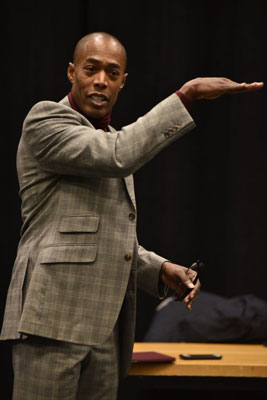 It’s certainly been a very challenging time, but also one with great possibilities for change. As the Head of Vocal Performance in the Department of Drama at Tisch School of the Arts at NYU – What would you say to young people today during this challenging time?
It’s certainly been a very challenging time, but also one with great possibilities for change. As the Head of Vocal Performance in the Department of Drama at Tisch School of the Arts at NYU – What would you say to young people today during this challenging time?
We have a moment that has demanded a sort of stasis. Pandemic quarantine took away all the distractions that engage our day to day. Not to dismiss the worry and stress that it brought to our communities in terms of work, and finances. But it was the first time in a long time when everyone had to stay in and stay still. In that moment there is a temptation to surrender but I encouraged artists to engage their art.
Write, create, scream into your journal, but plant seeds for future work. This is an incredibly radical moment in our lifetimes. How will future generations look back and learn if not for the art we create in this moment. Then we had a focus on what has been happening to black bodies since the beginning of our enslavement here in this country. And in that stillness the world saw the brutality through a new perspective. People took to the streets and continue to do so.
There are many ways to protest and I encourage it all but most importantly I say VOTE! This moment requires everyone to look deep and open their hearts in a new way. I encourage that openness. I try to model generosity of spirit and challenge to my white counterparts to honestly, fully and completely do the work of helping to dismantle systemic racism.
How have you been able to stay creative?
I write. I’ve been working on a new show creating every day. Also, the choir keeps me busy as we’ve shifted all of our outreach music programs and our musical work to virtual and video. It requires a different kind of preparation and follow through. It has been challenging but we’re getting the process down as we want in this moment to continue our mission of healing through the power of music and service.
Art has been my lifesaver in this moment. It’s given my rage, my pain, my sorrow, my anger, and ultimately my joy a strong and clear voice. I’ve also been singing a lot more. Performing for different virtual events. That’s been scary and great because my voice is getting strong again and I want to keep it up. When you don’t do eight shows a week regularly anymore you lose that vocal dexterity. I want to get it back and keep it during this time.
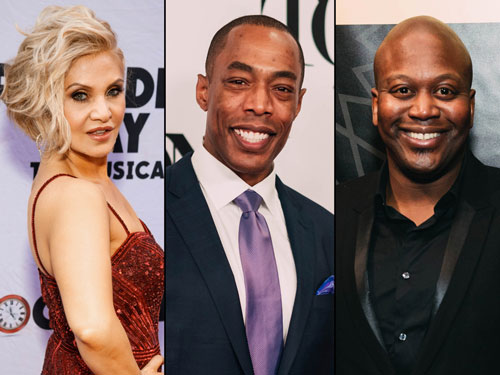
LtoR: Orfeh, Michael McElroy and Titus Burgess as part of a Stephen Sondheim Tribute concert at Carnegie Hall. photo : Emilio Madrid, Broadway.com
What do you love the most about performing in musical theater - as well as teaching and sharing what you’ve learned about the art of performing?
I love the ability to connect with others. My history is steeped in service. I love learning more as a teacher and I love giving back by mentoring the next generation of artists. The challenge is when you teach you have to practice what you preach. Musical theater has always been something I loved.
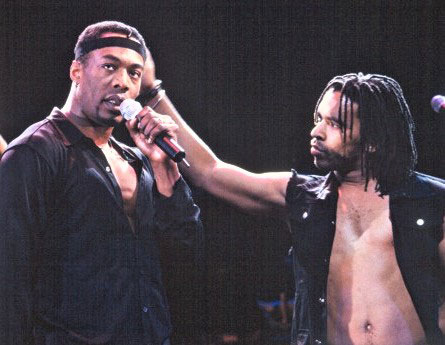
Michael McElroy in “RENT” at City Center Encores.
I had a lot of energy as a child but when I went to the theater I was mesmerized. I loved the music, the characters, the stories. I could dream and imagine myself in other places. The music always intrigued me because I wanted to know how notes together with words could make me feel so much. That curiosity lives in me today and influences the ways in which I write and arrange.
You’ve had a most exciting career from “Big River” and all the plays and musicals you’ve been a apart of – In approaching a new role – what are you seeking from the director? – and what should the director be expecting you to bring to the production?
The actor – director relationship should be a partnership. In the best cases there is trust and the space the director creates so the actor can be brave. That’s how it was with Jeff Calhoun in “Big River.” I had many reservations about playing Jim. I was intrigued by the fact that Jim could do American Sign Language. That cracked the story and the possibilities that were open for me. But I still had concerns about playing this role. I didn’t want to be a stereotype.
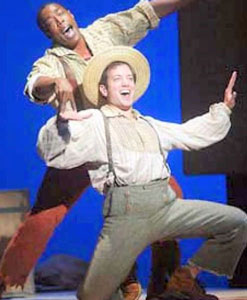
Michael McElroy as Jim and Tyrone Giordano as Huckleberry Finn in a preview performance of "Big River" at the Curran theater in San Francisco, 2004. photo: Mike Kepka
So, I was honest with Jeff when I accepted the role and he agreed to be open to my thoughts. As I continue to grow and teach I’m adamant that the actor must come into the room having done their work and contributing to the creative process and still be open to the other actors and creative team.
A new role has additional needs. You’re forging a road where one doesn’t exist so the actor must do research and bring everything they have to the process. There’s nothing worse than an actor who waits to be told what to do. We must play our part.
I’m terrified and excited about the unknown path. And when you get to create it as I have been fortunate to do, especially being a black man, to hear young black actors say that hearing me play Flick in “Violet” inspired them to know they could pursue their dream, that’s a true gift.
You’re also the Founder/Musical Director and Arranger for Broadway Inspirational Voices (BIV), a multi-racial gospel choir comprised of Broadway performers from several shows. What was the impetus to create this inspiring choir? What have you been learning from its performances?
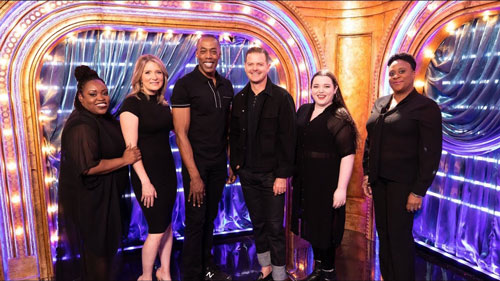
Broadway Inspirational Voices Choir
I created BIV in 1994 as a response to the AIDS epidemic ravaging the Broadway community. I wanted to bring gospel music in a benefit concert for Broadway Cares Equity Fights Aids. I wanted to invite a diverse group of friends to sing and a diverse group of folks showed up and it was a very healing experience.
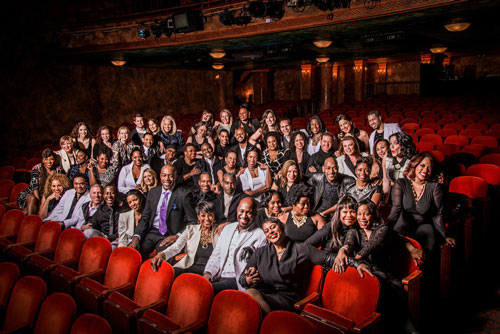
Broadway Inspirational Voices Choir
Everyone felt welcomed and many folks who had been shunned from spaces because of who they were or how they identified found they were welcome in the space we created. And here we are twenty-five years later, over eighty members strong, still diverse and bringing music that hopefully inspires and transforms people’s lives.
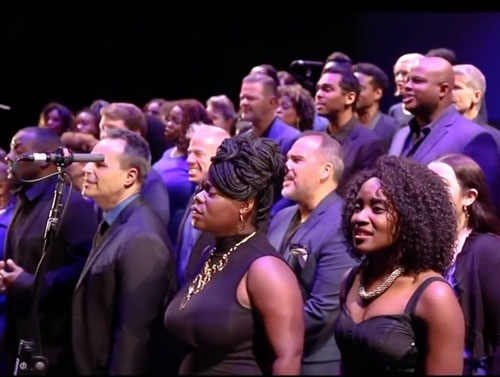
Broadway Inspirational Voices Choir on the 2019 Tony Awards
You were part of the Great American Songbook Academy last year. What did that experience mean to you? What led you to discover your personal way of connecting with a song?
I was asked through my friend Catherine Walker who teaches in the Musical theater program at University of Michigan. It was amazing. Incredibly talented young people. I had a great time. Sad that it won’t be happening this year because of what’s going on in our world. What led me to connect to song was simply living.
The more you live, the more you love, the more you get your heart broken, the more you find your joy and passion, the more you live life, the more fodder you have to pull from when you approach a song. That’s one of the great things about getting older.
You have also been a very busy arranger, with your arrangements performed at some of the most prestigious performance halls in this country, as well as in churches around the country. Was a seed planted in your life early on that led you to have this extraordinary gift?
I come from a musical family. My grandmother played the piano, my mom still plays every Sunday, my brother, sister, uncle, all my nieces and nephews play and sing so I grew up surrounded by music. Gospel music, classical music, R&B, jazz, musical theater. My family loved music.
Being a son of a preacher and grandfather of a minister who started our church, I was raised in service. It was instilled in me to give back and that has always been at the center of everything I do.
What are some of the lessons that you have learned that you share about why it’s so necessary to develop a strong vibrant vocal instrument, and to keep nourishing it?
Technique gives you options and longevity. I describe it as the trampoline. It's not quicksand or concrete. Technique should not anchor you or hold you down it should be underneath you for you to leap and bounce up from if you need it. It should support you in that way.
And every voice is different. There is no one way and the voice changes over time. But I love to sing and will always do. Even if it’s just for myself in the shower, I’m always going to sing.•








































